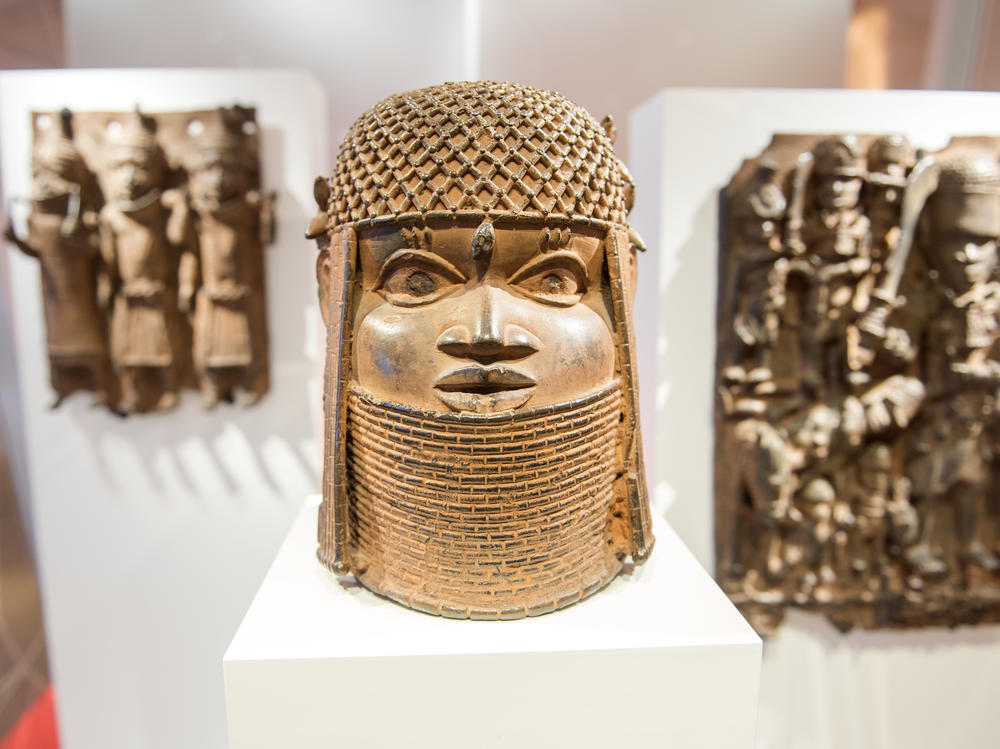Section Branding
Header Content
Germany Will Repatriate Benin Bronzes, Plundered From Africa In The 19th Century
Primary Content
German officials say they have reached an agreement with Nigeria to return a share of plundered artifacts known as Benin Bronzes.
Thousands of plaques and sculptures were looted from the ancient Kingdom of Benin — now southern Nigeria, not the modern nation of Benin — by British soldiers in an 1897 raid, and were ultimately acquired by museums largely in Europe and the United States.
For the last decade, a consortium known as the Benin Dialogue Group has been working to repatriate these works and establish a permanent display in Benin City, in partnership with museums in Germany and other European nations. German officials announced on Thursday that they will work with Nigeria on plans to return some of its Benin Bronzes in the year ahead.
"The participants are in agreement that addressing Germany's colonial past is an important issue for the whole of society and a core task for cultural policy," they wrote in a joint release.
The German officials aim to return the first of their Benin Bronzes next year, and will release more specific plans and timetables by this summer. They said they "reaffirm their willingness in principle to make substantial returns" of the artifacts, but left the door open to keeping some of them.
"Discussions with the Nigerian partners are to cover not only returns to and cooperation projects in Nigeria, but also whether and how Benin Bronzes, as part of humanity's cultural heritage, can in future be shown in Germany as well," they said.
Numerous German museums are in possession of Benin Bronzes, the officials said. They invited the ones who are not part of the Benin Dialogue Group to join in their efforts.
There are far more of these historical objects scattered across the globe than in their native country, according to author Dan Hicks. He told Art News that 45 institutions in the United Kingdom and 38 in the U.S. hold Benin Bronzes, compared to just nine in Nigeria.
Berlin's Ethnological Museum is home to one of the world's largest collections of artifacts from the ancient kingdom, as The Associated Press reports. Its inventory is estimated to include some 530 items, including 440 bronzes. And roughly 900 such artifacts are housed in the British Museum alone.
Activists are increasingly calling for cultural institutions to repatriate their Benin Bronzes — widely seen as a symbol of colonial conquest — to Nigeria, though few have actually done so.
The French state promised two years ago to repatriate 26 such artifacts by 2021, but, as Art News reported this month, none has permanently left the country yet.
And while the British government has said institutions should "retain and explain" controversial artifacts, some regional U.K. museums appear to disagree, as the Guardian reports.
Scotland's University of Aberdeen announced last month that it would imminently return a bust it had acquired in the 1950s, citing ethical concerns.
"Our panel concluded that this was acquired as loot and therefore, we didn't feel we had moral title," said Neil Curtis, head of museums and special collections at the University of Aberdeen.
The next meeting of the Benin Dialogue Group is set for May 27.
Copyright 2021 NPR. To see more, visit https://www.npr.org.

